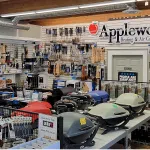
Okanagan’s $688,000 new milfoil harvester is first of its kind in North America
What cost $688,000, is vital to the Okanagan’s tourism industry, and is looking for a name?
If you said the newest milfoil harvester used to control the weed on the valley’s lakes, you would be right.
The Okanagan Basin Water Board held a launch event on Thursday at Paddlewheel Park in Vernon to introduce the new amphibious machine [operates on land and water] which was designed and built in Germany by Berky.
 Berky milfoil harvester in action (photo credit: Berky)
Berky milfoil harvester in action (photo credit: Berky)



